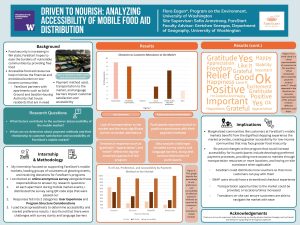Driven to Nourish: Analyzing Accessibility Barriers in Mobile Food Distribution
Is your grocery bill getting more expensive every month? Most Americans would say the same, with prices up nearly 30% over the past 5 years — and no end in sight. Communities that are most impacted by this problem are the ones least equipped to adapt to it. FareStart, a social enterprise nonprofit, has a mission to address this issue. Their solution? The mobile market: a truck that carries fresh produce recently harvested or donated from around the King County region. It provided the opportunity for those facing food insecurity to access it right in their neighborhood. FareStart’s mobile market brought resources directly to low-income and vulnerable communities. Our next challenge: increasing market accessibility. Despite the direct connection between FareStart and households or individuals that need fresh food, this doesn’t mean everyone can take advantage of this resource. Obstacles that prevent food from reaching the hands that need it include perceived barriers (shame, stigma), as well as actual barriers (transportation, work/other responsibilities, childcare, and lack of education/resources). In order to determine which of these impact market customers most significantly, I surveyed clients from mobile markets to determine which obstacles were the most prevalent. This study, although specific to the customers at FareStart’s markets and flawed by survey inaccuracy aspects, was able to help us determine preferences for accessibility at markets and what could be done to improve customer experience. This could mean more members of vulnerable communities could benefit from the resources FareStart provides and help decrease food insecurity.
